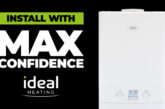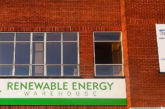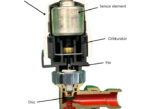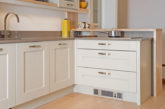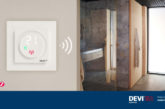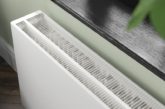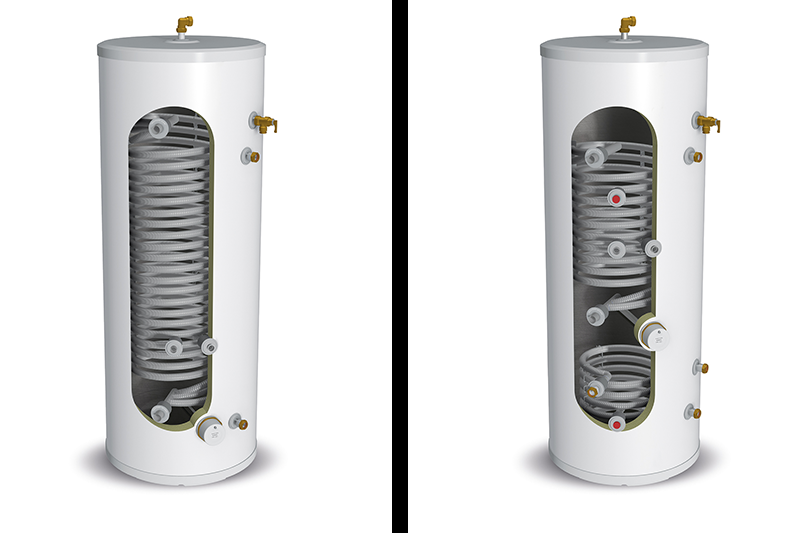
Following the launch of its Platinum range of unvented cylinders, Neil Overton, Sales Director at Gledhill, answers some questions on the new offering.
Earlier in the year, Gledhill launched its Platinum range of unvented cylinders. What were the reasons for this move?
We are dedicated to providing installers and homeowners with a solution to every application. Previously, Gledhill only manufactured unvented cylinders ranges with external expansion options such as; the StainlessLite Plus, Stainless Pro and Stainless ES. The Stainless Platinum range is the latest addition to our wide range of unvented cylinders that now removes the need of an external expansion vessel.
How have you eliminated the requirement for an external expansion vessel?
The Stainless Platinum range eliminates the need for an external expansion vessel by incorporating an internal air pocket and baffle inside the cylinder. When the water is heated within a standard hot water cylinder, the volume of the water expands and therefore requires a separate external vessel installed alongside the cylinder.
For the Stainless Platinum, the internal air pocket and baffle inside the cylinders has the ability to expand and compress within the stainless-steel body of the cylinder, meaning the need for an external expansion vessel is eliminated. It reduces the time for installation as well as minimising the pipework and space needed.
Without the need for an external expansion vessel, are the company’s Platinum cylinders easier to install?
The internal expansion allows for a neat and compact system as well as producing space saving capabilities. As the need for an external expansion vessel has been removed, installers now have the benefit of being able to utilise tighter spaces when installing the cylinders, providing an easier installation.
Sustainability is an increasing issue for many people. When a Heat Pump is being installed as the main source of heat in a property is a specific type of cylinder required?
The UK’s drive towards Net Zero by 2050 is becoming a fast reality, with the forthcoming introduction of the 2025 ‘Future Homes standard’, Britain’s house builders are looking at alternative solutions to heat and supply domestic hot water to our homes, such as Heat Pumps.
Therefore, to achieve this, Heat Pumps do require an unvented cylinder which needs to be specifically designed to work with this technology.
At Gledhill we have designed highly efficient domestic hot water cylinders that work specifically with low temperature heat pumps by combining a larger heat exchange for maximum heat transfer, with new thermostatic control integration, ensuring reliable and hot domestic water.
Also, it is vital that the right size of cylinder has been specified for the installation. Increasing the size of the domestic hot water cylinder for low carbon technology enables you to store more usable hot water, but also ensures that the hot water is heated as efficiently as possible.
Are there any other considerations that need to be taken into account when selecting a cylinder for use alongside a heat pump?
In order to support the government’s commitments to Net Zero, there needs to be a shift towards renewable technologies across the HVAC sector. As part of this shift there are other considerations that need taking into account, such as legislation.
New technologies such as Heat Pumps need domestic hot water cylinders which will require more space than the traditional combi-boiler. Solar Photovoltaic and Solar Thermal systems both need a way to store the energy they create which again means that hot water cylinders or thermal stores need to be factored into new build properties. Legislation and building regulations have often been used to help guide developers through incorporating efficiency changes. We can see this continuing with the Interim Part L arriving in December 2021, for implementation in 2022, and followed by the Future Homes Standard in 2024, for implementation in 2025.
If solar thermal panels are being added to a system, would a new cylinder also be required?
If a customer is looking to install solar thermal panels to their property, a new cylinder that has been specifically designed for this would be needed. The reason behind this is based on the coils within the cylinder, as each coil is attached to a certain heat source.
For example, indirect cylinders that are heated by a conventional boiler (either gas or oil), will work in tandem with a coil specifically for that heat source. If an additional heat source, such as solar panels, have been added to the property, it will need a second high performance coil within the cylinder to work with it.
What qualifications are required to fit a cylinder?
When it comes to installing hot water cylinders, strict safety regulations have been put in place due to its high-pressure performance. The means that installers must have a G3 qualification if they wish to install any hot water cylinder within a domestic property.
The qualification covers the inspection, installation, commissioning, and servicing of a hot water system.


